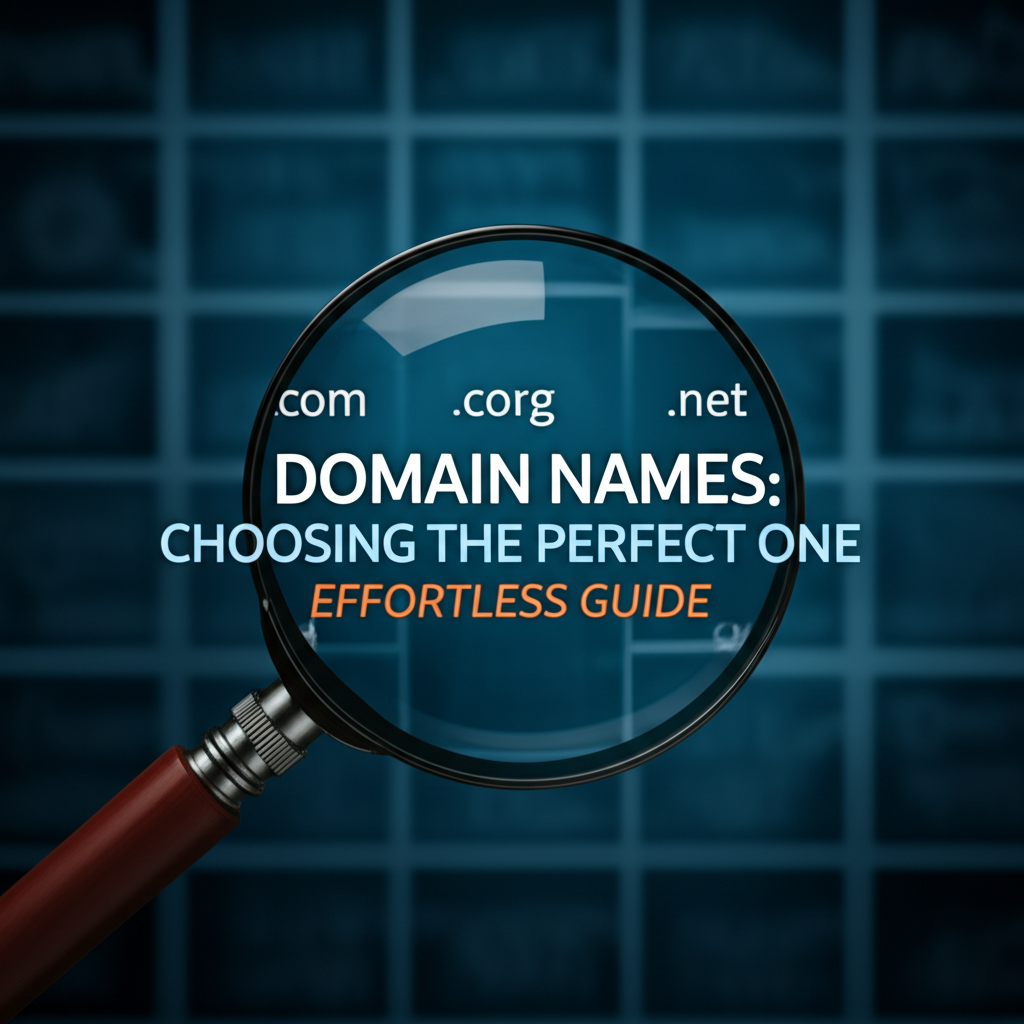- Why are Domain Names So Important?
- Navigating the World of Domain Names: Key Considerations
- Relevance to Your Brand and Niche
- Keyword Integration (But Don't Overdo It!)
- Keeping it Short, Memorable, and Easy to Spell
- Domain Name Extensions: Choosing the Right One
- Domain Name Availability and Registration: A Step-by-Step Guide
- Beyond Registration: Managing Your Domain Name
- Investing in the Perfect Domain Name: A Long-Term Strategy
Domain Names: Choosing the Perfect One (Effortless Guide)
Domain names are the digital addresses of your website, the gateway through which users find your online presence. A well-chosen domain name can significantly impact your brand’s visibility, credibility, and overall success. Choosing the right domain requires careful consideration of several factors, and this effortless guide will walk you through the process, ensuring you find the perfect online address for your needs.
Why are Domain Names So Important?

Your domain name is often the first impression you make on potential customers. It’s a crucial element of your brand identity, influencing how people perceive your business. A memorable and relevant domain name can boost brand recognition, making it easier for customers to find and remember you. It also plays a vital role in search engine optimization (SEO), impacting your website’s ranking in search results. A strong domain name can contribute to higher search rankings, driving more organic traffic to your site.
Navigating the World of Domain Names: Key Considerations
Choosing the perfect domain involves several key considerations. Let’s explore some crucial factors to keep in mind:
Relevance to Your Brand and Niche
Your domain name should clearly reflect your brand and the products or services you offer. A relevant domain name enhances brand recognition and helps users understand your website’s purpose at a glance. For example, if you’re selling handmade jewelry, a domain name incorporating “jewelry” or a related term would be highly relevant.
Keyword Integration (But Don’t Overdo It!)
Integrating relevant keywords into your domain name can be beneficial for SEO. However, avoid keyword stuffing, which can make your domain look spammy and negatively impact your search rankings. Subtly incorporating one or two primary keywords is generally sufficient. For instance, if you’re a photographer specializing in weddings, a domain name like “weddingphotographyby[yourname].com” could be effective.
Keeping it Short, Memorable, and Easy to Spell
A short and memorable domain name is easier for users to recall and type into their browsers. Avoid using hyphens, numbers, or complex spellings that could confuse potential visitors. A simple, easy-to-spell domain name minimizes the risk of users mistyping it and landing on a competitor’s site.
Domain Name Extensions: Choosing the Right One
The domain name extension, also known as the top-level domain (TLD), is the suffix that appears at the end of your domain name (e.g., .com, .org, .net). While .com remains the most popular and widely recognized TLD, other extensions can be suitable depending on your business. For instance, .org is commonly used by non-profit organizations, while .net is often used by technology-related businesses. Consider your target audience and choose an extension that aligns with your brand and purpose.
Domain Name Availability and Registration: A Step-by-Step Guide
Once you’ve identified a few potential domain names, the next step is to check their availability and register your chosen domain. Here’s a simple guide to help you through the process:
1. Use a Domain Name Checker: Numerous online tools allow you to check the availability of domain names across various extensions. Enter your desired domain name into the checker to see if it’s available.
2. Compare Prices and Choose a Registrar: Domain name registrars are companies authorized to sell domain names. Compare prices and services offered by different registrars before making a decision.
3. Complete the Registration Process: Once you’ve chosen a registrar, follow their instructions to complete the registration process. This typically involves providing your contact information and payment details.
4. Protect Your Privacy: Consider opting for domain privacy protection, which hides your personal contact information from public WHOIS directories, reducing spam and unwanted solicitations.
Beyond Registration: Managing Your Domain Name
After registering your domain name, you’ll need to manage its settings and connect it to your website. This involves pointing your domain to your web hosting server using DNS records. Your registrar will typically provide instructions on how to manage your DNS settings. You can also access advanced domain management features through your registrar’s control panel.
Investing in the Perfect Domain Name: A Long-Term Strategy
Choosing the right domain name is a crucial investment in your online presence. A well-chosen domain contributes to brand building, improves SEO, and enhances user experience. By following the guidelines outlined in this effortless guide, you can confidently navigate the world of domain names and secure the perfect online address for your website, setting your business up for long-term success in the digital landscape. Remember to regularly review and update your domain name strategy as your business evolves, ensuring your online address remains a valuable asset for years to come.















Leave a Reply